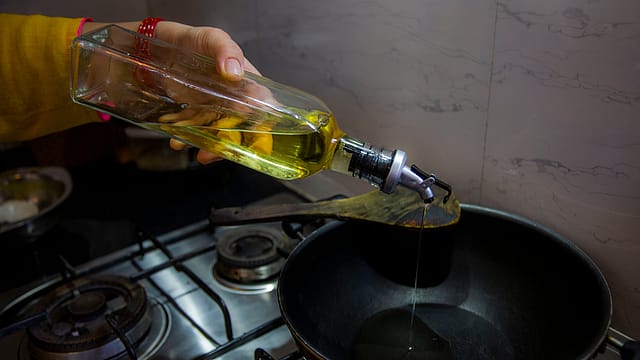India stares at edible oil price spike; 90% sunflower oil came from Ukraine-Russia
ADVERTISEMENT

With the Ukraine-Russia war continuing indefinitely, a hike in edible oil prices as well as shortage in supply seems round the corner, at least for the short-term. After all, 90% of India's sunflower oil requirement is catered by Ukraine and Russia and shipments have completely stopped ever since the war started. Sunflower oil comprises 15% of most edible oil brands. "If that 15% doesn't come for a longer period of time then consumers will have to shift to soybean, rice-bran or palm oil," points out Angshu Mallick, CEO, Adani Wilmar, makers of the Fortune brand of oil.
He, however, points out that there isn't a need to panic as most companies have inventory of at least 45 days. "We are the largest importers of edible oil and we have managed our stocks better than most other brands. Since our partner, Wilmar, has operations in those countries we were prepared well in advance," claims Mallick. However, Sanjeev Asthana, CEO, Ruchi Soya says that if the war continues till April, the sunflower sowing season could get impacted, and that could lead to scarcity for a longer period. "So, the pressure would be on to soya oil, which has two dimensions. Both in Brazil and Argentina, from where we import soybean, the crop looks sluggish. To add to that is the mandate on biodiesel and how much of soya oil needs to be used there. There is rapid work happening in Argentina and Brazil which has led to supply shortage," explains Asthana.
He says there is a 10-15 million tonne shortage of the soybean crop. Between sunflower oil and soybean oil prices have gone up by $300-$500 per metric tonne. "Demand going towards soya and soya itself falling a little short is having a spiralling impact on commodity prices. However, this situation will not last for long. It's a war premium that we are paying and the moment the war ends the prices will be back to earlier levels," says Asthana, who expects a definitive moment towards soyabean oil. "Sunflower is a concern therefore customers may move to soya consumption…it depends on the impact on the sunflower oil pricing. But this won't be for the full year, so I am imagining anywhere between 400,000 tonnes to 600,000 tonnes of sunflower oil consumption will go to soybean. We will have to reassess the situation in three-four months," he further adds.
Asthana says that the situation is certainly not that bad that India is left with just a week on stocks. "It is incorrect. All companies carry stock of 35-40 days. The war may have some impact in terms of prices and volumes, but that's not going to be dramatic."
However, Nitin Jain, MD, Protiviti India, is expecting severe supply chain issues due to the ongoing war. "Companies are finding ways to save costs so that they can absorb the pressure. Business continuity planning has become critical and a lot of companies have started developing parallel sources of obtaining materials. They are also finding ways to balance sunflower oil by using other ingredients."
In 2021, India imported 8.3 million metric tonnes of palm oil, 2.9 million metric tonnes of soyabean oil and 1.9 million metric tonnes of sunflower oil.